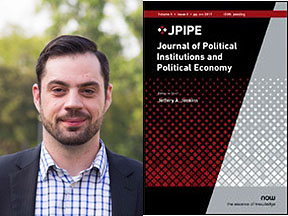
Assistant Professor Ian Turner has an article in the Journal of Political Institutions and Political Economy entitled “Reviewing Procedure versus Judging Substance: How Increasing Bureaucratic Oversight Can Reduce Bureaucratic Accountability.”
Abstract:
How does the scope of review affect bureaucratic policymaking? To explore this question, I consider a policymaking environment in which an expert agency develops policy that is upheld or overturned by an overseer who may have different policy goals. The agency can affect the quality of implementation through effort investments in addition to choosing the substantive content of policy. Under procedural review the overseer only reviews the agency’s effort, which allows the agency to fully utilize its expertise. Substantive review also tasks the overseer with judging agencies’ substantive policy choices, which can lead the agency to disregard its superior information and obfuscate to avoid reversal. Depending on the policy environment, this dynamic can either benefit or harm the overseer. In some cases the overseer can be made better off by having less transparent review institutions; that is, institutions that direct the overseer to only review procedure and preclude judging substance.